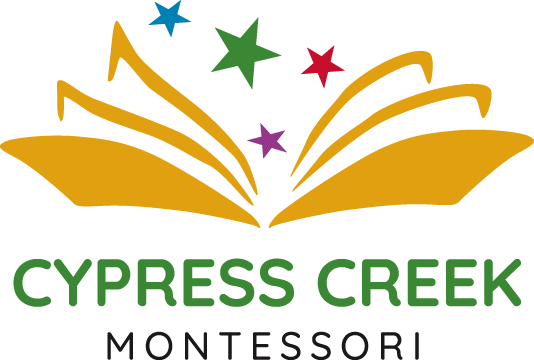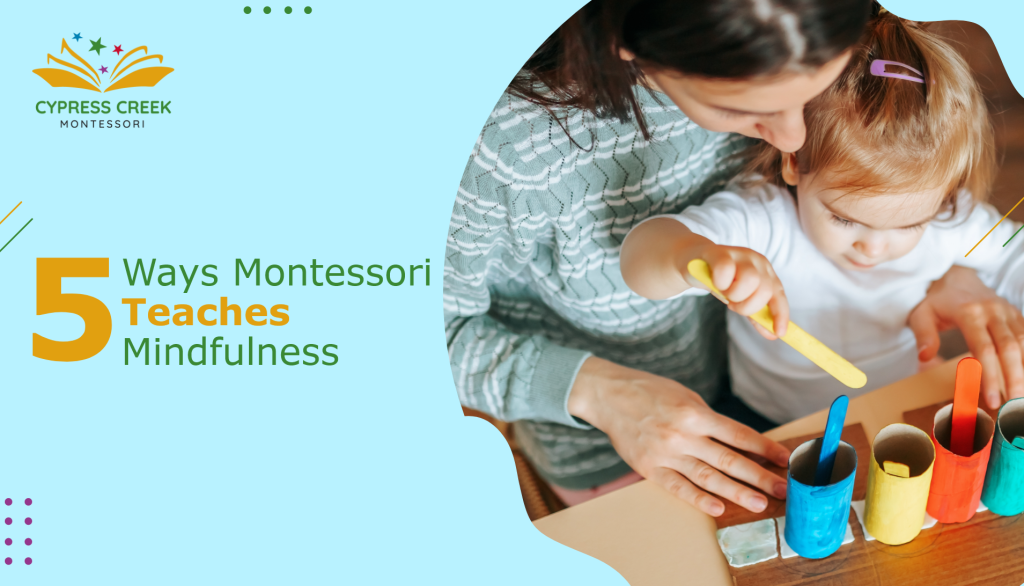Mindfulness is a growing area of study with important implications for children as they grow up. In this blog post, we’ll explore five ways Montessori teaches mindfulness.
What is Mindfulness?
Mindfulness is a state of active, open attention to the present. When you’re mindful, you observe your thoughts and feelings from a distance without judgment. Instead of letting life pass you by, mindfulness means living in the moment and awakening to experience.
In Montessori education, mindfulness takes two forms:
- Attending to objective reality (e.g., observing objects around us)
- Attending to subjective reality (e.g., observing our inner world).
Both types of attention help children develop their self-awareness, ability to focus, and empathy for others.
1. Sensory Experiences
One of the main goals of the Montessori Method is to provide sensory experiences every day. The aim is to help children develop their senses to learn more effectively and engage in their environment. Here are examples that can be used in and out of the classroom:
- Touch: Exploring textured items in different sizes, so they are easy for children to hold.
- Smell: Provide flowers, herbs, spices, and essential oils for smelling during class time.
- Taste: Use chocolate chips, jellybeans, raisins—anything edible your child will enjoy eating!
2. Deep Concentration
Montessori teachers encourage children to practice deep concentration. Deep concentration is focusing on one thing for longer than they think they can without getting distracted. This essential skill helps students pay attention in class, stay engaged with their studies, and remember what they learn. The prepared Montessori environment is meticulously designed to foster calm and concentration. The classroom is uncluttered, beautiful, clean, orderly, and inviting, with sensorial materials to enhance each child’s deep awareness of their senses.
3. Walking Meditation
Walking meditation is used in many different cultures and religions, so it’s easy to understand why it can be an effective mindfulness tool. The idea is that they focus on their breathing and walk slowly and deliberately. They are also aware of their surroundings, which helps keep their mind in the present moment. In addition to these benefits, walking meditation promotes physical fitness as well!
4. Yoga
As part of the Cypress Creek Frisco MontessoriHome enrichment program, our Montessori educators encourage students to practice yoga. Our teachers demonstrate simple lessons with slow, intentional step-by-step movements using soft voices and minimal words. This helps children develop mindfulness from the focus and concentration originated while working with the didactic materials created by Montessori.
5. Age-Appropriate Essential Oils
A popular method of using essential oils is to put them in a diffuser that emits the scent into the air. Using an age-appropriate essential oil has been shown to help young children focus and become less distracted by their surroundings, making it easier for them to learn new concepts. Some beneficial focus-inducing oils include lavender, peppermint, and lemon—each of which has different effects depending on their use.
Why Cypress Creek Frisco Montessori?
Cypress Creek Frisco Montessori supports the holistic development of your child— mental, physical, emotional, and social. Mindfulness is integrated into our curriculum because its focus on improving a child’s well-being partners seamlessly with the Montessori philosophy of preparing children for life. Cypress Creek Frisco Montessori can help your child be more mindful of their world and how they experience it. Contact us today to schedule a tour of our facility!

